Jake Sullivan, U.S. President Joe Biden’s national security advisor, spent several days in Israel late last week sizing up Prime Minister Benjamin Netanyahu’s new government, which, after less than a month in office, has already managed to alienate legions of Israelis and Diaspora Jews.
Sullivan was the first Biden administration senior official to confer with Netanyahu, who roared back to power after assembling a coalition government following last November’s general election, the fifth since 2019.
Prior to Sullivan’s trip, Israeli Strategic Affairs Minister Ron Dermer — Israel’s former ambassador to the United States –visited Washington, D.C. to confer with American officials.
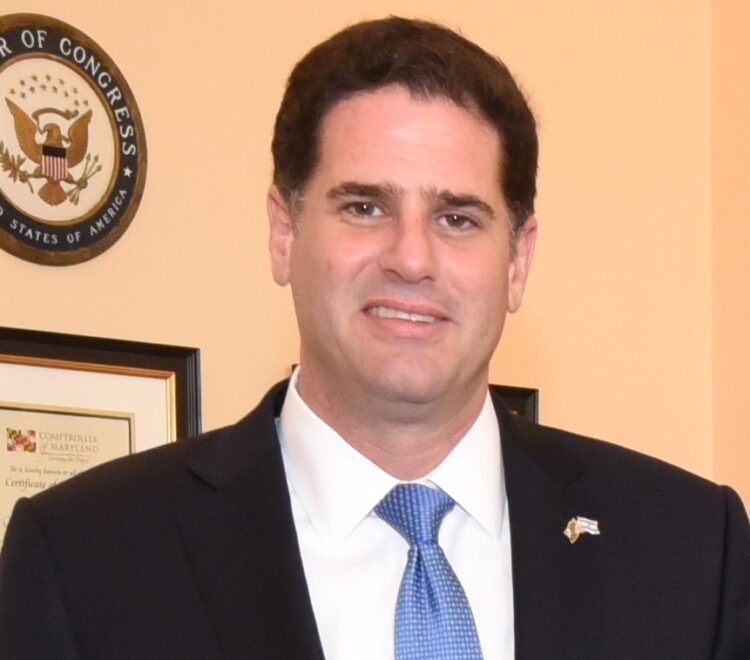
Sullivan was dispatched to Israel, the U.S.’ chief ally in the Middle East, to gain a more nuanced understanding of Netanyahu’s government and to lay the groundwork for Secretary of State Antony Blinken’s visit, which is expected to take place fairly soon.
President Joe Biden will most likely invite Netanyahu to the White House after Blinken returns to Washington.
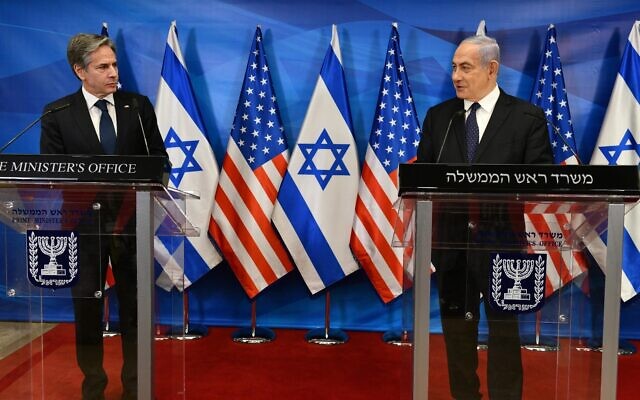
Prior to Sullivan’s arrival in Israel, the Biden administration laid out its general approach to Israel’s new government, the most right-wing and religiously conservative in Israeli history.
Blinken, in a wide-ranging speech to JStreet, a dovish American Jewish organization critical of Israel’s stance toward the Palestinians and of its web of settlements in the West Bank, struck a delicate balance.
“We will gauge the (Israeli) government by the policies it pursues rather than by its individual personalties,” he said, implicitly referring to two of the most extreme and divisive figures in Netanyahu’s cabinet: Finance Minister Bezalel Smotrich of the Religious Zionist Party and National Security Minister Itamar Ben-Gvir of the Jewish Power Party, both of whom vehemently reject a two-state solution and advocate the annexation of much of the West Bank.
“We will hold Israel to the mutual standards we have established in our relationship over the past seven decades, and we will speak honestly and respectfully with our Israeli friends, as partners always should,” he added.
In his speech to JStreet, Blinken broadly spelled out the principles of U.S. policy:
The United States will seek to strengthen its alliance with Israel while improving its ties with the Palestinian Authority and providing humanitarian assistance to the Palestinians.
Washington will attempt to expand the 2020 Abraham Accords, which resulted in path-breaking normalization agreements between Israel and four Arab countries, the United Arab Emirates, Bahrain, Morocco and Sudan. At the same time, as Blinken pointed out, these accords are not “a substitute for building peace between Israelis and Palestinians.”
The Biden administration, while supporting a two-state solution, accepts former president Donald Trump’s recognition of Jerusalem as Israel’s capital and his decision to move the U.S. embassy from Tel Aviv to Jerusalem. But, as Blinken noted, Jerusalem “must be a city for all of its people.” In other words, East Jerusalem and West Jerusalem should respectively be the capital cities of a Palestinian state and Israel.
Israel will surely object to certain parts of Blinken’s blueprint for peace, particularly its references to Jerusalem and Palestiniaan statehood.
In the wake of Blinken’s speech, Biden said he looked forward to working with Netanyahu to address “the many challenges and opportunities facing Israel and the Middle East, including threats from Iran.”
Biden said he would continue to endorse a two-state solution, and, in a tacit jab at Netanyahu, he declared he would “oppose policies that endanger its viability.”
The United States will doubtless oppose Netanyahu’s principled support for annexing parts of the West Bank and expanding and deepening Israel’s network of settlements there.
Under the guidelines Netanyahu signed with his coalition partners, “the Jewish people have an exclusive and inalienable right to all parts of the Land of Israel,” an area that includes the West Bank.
The being the case, the Biden administration will reportedly hold Netanyahu personally responsible for the actions of his government with respect to the Palestinian issue.
“We’re going to judge this on actions, not just coalition agreements or comments in the press,” the U.S. ambassador, Tom Nides, said recently. “Netanyahu told us that he’s got his hands on the wheel, so now he needs to drive that proverbial car.”
Earlier this month, Blinken came out against Israeli policies that lead to annexation in the West Bank and alter the status quo at the Temple Mount complex in eastern Jerusalem.
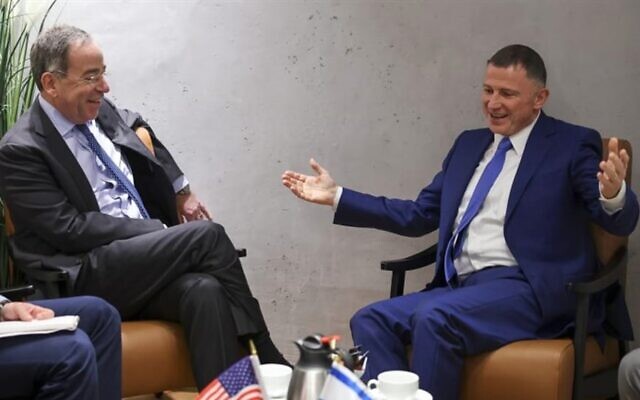
Several days before Sullivan’s arrival, the chairman of Israel’s Foreign Affairs and Defence Committee, Yuli Edelstein, told Nides that Israel intends to expand settlements in the West Bank. “I expressed … my clear position regarding the need for construction in the areas of settlement in Judea and Samaria,” he said. “Families there are growing, and their lives cannot be stopped. Construction should continue.”
During his trip, Sullivan met the Israeli leadership from Netanyahu and Foreign Minister Eli Cohen on down.

To no one’s surprise, Netanyahu’s office released a communique that virtually ignored the Palestinian question and accentuated the importance of enlarging the Abraham Accords and keeping Iran out of the nuclear club.
Netanyahu hopes to persuade Saudi Arabia to join the Abraham Accords, but as its foreign minister noted recently yet again, this objective is entirely dependent on whether the Palestinians achieve statehood.
As far as Iran is concerned, the United States’ position is that the Iranian regime should not be permitted to acquire nuclear weapons. For the past year, the Biden administration has been working to revive the 2015 Iran nuclear agreement, which Israel strenuously opposed, but talks in Vienna to renew it have floundered.
Prior to Sullivan’s visit, Israel decided to withhold taxes it collects on behalf of the Palestinian Authority and to revoke the VIP entry permits of several key Palestinian officials. Israel took these steps after the Palestinians convinced the International Court of Justice to investigate Israel’s occupation of the West Bank. The Biden administration condemned the Palestinian initiative, but disapproved of Israel’s retaliatory sanctions.
Sullivan, in comments during his visit, underscored the Biden administration’s commitment to a two-state solution and its willingness “to discourage policies that endanger its viability.”
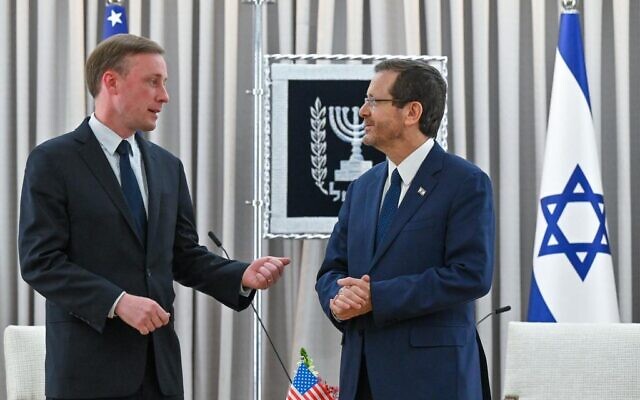
Sullivan also raised an internal issue — the Israeli government’s professed desire to weaken the Supreme Court by means of special legislation.
It has yet to be determined when Netanyahu will visit the White House, but last July he and Biden met briefly in Israel. Netanyahu warned Biden that economic sanctions were not enough to keep Iran from acquiring a nuclear arsenal. “We need one thing,” Netanyahu said. “A credible military option.”
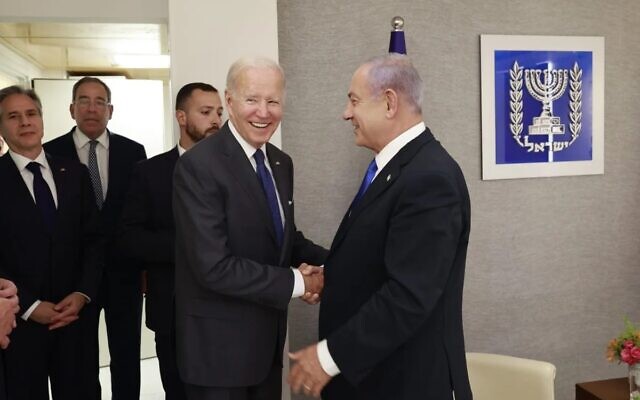
Biden and Netanyahu have known each other for several decades, and Biden apparently is fond of him, judging by a photograph he gave him inscribed with this caption: “Bibi, I don’t agree with a damn thing you say, but I love you!”
Netanyahu regards Biden as a Christian Zionist whose instinctive attachment to Israel is unquestioned. Nevertheless, they have clashed in the past over the construction or expansion of settlements in the West Bank and the Iran nuclear accord.
Certainly, Biden has had a better relationship with Netanyahu than one of his predecessors Barack Obama.
According to the former U.S. ambassador to Israel, Daniel Shapiro, the Biden administration seeks to minimize friction with Netanyahu and will try to focus on areas of consensus ranging from security cooperation to the expansion of the Abraham Accords.
But in all probability, Biden and Netanyahu are bound to clash sooner or later over two crucial issues — Israel’s expansionist policies in the West Bank and Iran’s attempt to become a nuclear power.
